LAS VEGAS (AP) — Winning the NBA Cup won't bring a championship parade to Oklahoma City or Houston or Atlanta or Milwaukee. There's a trophy. There's some cash. There are bragging rights. And that's about it.
The way the final four teams in the tournament see things, that's enough.
The semifinals of the NBA Cup are Saturday: Atlanta takes on Milwaukee, and Houston faces Oklahoma City, those games in Las Vegas — as will the championship game Tuesday night.
“As a kid, you grow up, you watch Lakers versus Boston on TV. You watch Miami versus Cleveland. You watch marquee matchups and you watch big games, and you dream about getting there one day,” Thunder star Shai Gilgeous-Alexander said. “To be in this position is special. You don’t take it for granted.”
For most of the players in these NBA Cup semifinals, this is their first time on such a stage. Only nine players currently on the Hawks, Thunder, Bucks and Rockets have ever been to the NBA Finals.
“We’re a group that’s trying to develop an identity,” Hawks coach Quin Snyder said. “Having some success can help that.”
It's not a totally surprising final four: Oklahoma City was the No. 1 seed in the Western Conference for last season's playoffs and if the season was over Friday the Thunder would have that seed again — just ahead of No. 2 Houston. And in the East, the Bucks (winners in 11 of their last 14) and Hawks (winners in seven of their last eight) are among the hottest teams right now.
“For a lot of guys that haven’t tasted the playoffs yet, it’s the closest thing to that as far as intensity and physicality and something on the line,” Rockets coach Ime Udoka said of the NBA Cup. “Meaningful basketball is really good for our young guys. They haven’t had a ton of those games.”
The Bucks have some players — Giannis Antetokounmpo and Khris Middleton among them — who have been to the NBA Finals and won. But getting to Vegas is a huge accomplishment, even for those guys, considering Milwaukee started 2-8.
“It’s just a lot on the line,” Bucks guard Damian Lillard said. “It requires you to focus. You’ve got to come and get the job done. So, I think in that way it’s similar to a playoff experience, just that you've got to get the job done.”
It's also a chance for teams that are considered small-market — there's no Boston or New York or Los Angeles teams in this final four — to get more national TV games and maybe pick up a few more fans.
“At the end of the day, you just want to win,” Gilgeous-Alexander said. “But it’s pretty sweet to be highlighted and showcased in a way. Yeah, it’s what dreams are all about, and for them to come true is special.”
—Atlanta vs. Milwaukee, Saturday, 4:30 p.m. EST (TNT)
Season series: Hawks, 1-0.
BetMGM line: Bucks by 3.5 points.
Outlook: Both teams are clearly playing their best basketball of the season. If there's one edge Milwaukee has, it's that the Bucks were in the NBA Cup semifinals (before it was called the NBA Cup) last season.
—Houston vs. Oklahoma City, Saturday. 8:30 p.m. EST (ABC)
Season series: Split, 1-1.
Outlook: The Rockets had to rally late and hold off Golden State in the quarterfinals, and the Thunder — since losing to Houston on Dec. 1 — are 4-0 and winning those games by a margin of 22.3 points.
AP NBA: https://apnews.com/hub/NBA
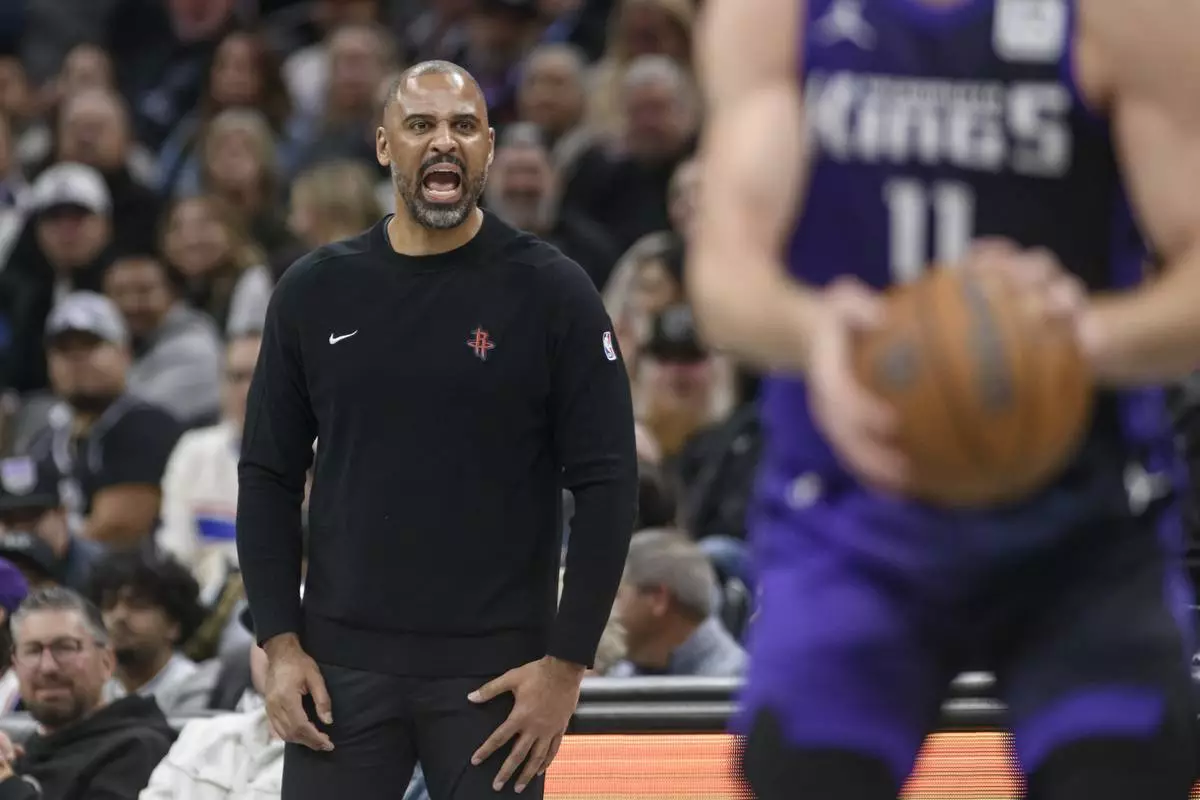
Houston Rockets head coach Ime Udoka shouts from the bench during the second half of an Emirates NBA Cup basketball game against the Sacramento Kings in Sacramento, Calif., Tuesday, Dec. 3, 2024. (AP Photo/Randall Benton)

Milwaukee Bucks' Damian Lillard prepares to shoot during the first half of an NBA basketball game against the Brooklyn Nets, Sunday, Dec. 8, 2024, in New York. (AP Photo/Heather Khalifa)

Atlanta Hawks head coach Quin Snyder reacts on the sideline during the first half of an NBA basketball game against the Denver Nuggets Sunday, Dec. 8, 2024 in Atlanta. (AP Photo/John Bazemore)

Oklahoma City Thunder guard Shai Gilgeous-Alexander (2) sticks his tongue out while celebrating a 3-pointer during the first half of an Emirates NBA Cup basketball game against the Dallas Mavericks, Tuesday, Dec. 10, 2024, in Oklahoma City. (AP Photo/Nate Billings)
HWANGE, Zimbabwe (AP) — When GPS-triggered alerts show an elephant herd heading toward villages near Zimbabwe's Hwange National Park, Capon Sibanda springs into action. He posts warnings in WhatsApp groups before speeding off on his bicycle to inform nearby residents without phones or network access.
The new system of tracking elephants wearing GPS collars was launched last year by the Zimbabwe Parks and Wildlife Management Authority and the International Fund for Animal Welfare. It aims to prevent dangerous encounters between people and elephants, which are more frequent as climate change worsens competition for food and water.
“When we started it was more of a challenge, but it’s becoming phenomenal,” said Sibanda, 29, one of the local volunteers trained to be community guardians.
For generations, villagers banged pots, shouted or burned dung to drive away elephants. But worsening droughts and shrinking resources have pushed the animals to raid villages more often, destroying crops and infrastructure and sometimes injuring or killing people.
Zimbabwe's elephant population is estimated at around 100,000, nearly double the land’s capacity. The country hasn’t culled elephants in close to four decades. That's because of pressure from wildlife conservation activists, and because the process is expensive, according to parks spokesman Tinashe Farawo.
Conflicts between humans and wildlife such as elephants, lions and hyenas killed 18 people across the southern African country between January and April this year, forcing park authorities to kill 158 “trouble” animals during that period.
“Droughts are getting worse. The elephants devour the little that we harvest,” said Senzeni Sibanda, a local councilor and farmer, tending her tomato crop with cow dung manure in a community garden that also supports a school feeding program.
Technology now supports the traditional tactics. Through the EarthRanger platform introduced by IFAW, authorities track collared elephants in real time. Maps show their proximity to the buffer zone — delineated on digital maps, not by fences — that separate the park and hunting concessions from community land.
At a park restaurant one morning IFAW field operations manager Arnold Tshipa monitored moving icons on his laptop as he waited for breakfast. When an icon crossed a red line, signaling a breach, an alert pinged.
“We’re going to be able to see the interactions between wildlife and people,” Tshipa said. “This allows us to give more resources to particular areas."
The system also logs incidents like crop damage or attacks on people and livestock by predators such as lions or hyenas and retaliatory attacks on wildlife by humans. It also tracks the location of community guardians like Capon Sibanda.
“Every time I wake up, I take my bike, I take my gadget and hit the road,” Sibanda said. He collects and stores data on his phone, usually with photos. “Within a blink,” alerts go to rangers and villagers, he said.
His commitment has earned admiration from locals, who sometimes gift him crops or meat. He also receives a monthly food allotment worth about $80 along with internet data.
Parks agency director Edson Gandiwa said the platform ensures that “conservation decisions are informed by robust scientific data.”
Villagers like Senzeni Sibanda say the system is making a difference: “We still bang pans, but now we get warnings in time and rangers react more quickly.”
Still, frustration lingers. Sibanda has lost crops and water infrastructure to elephant raids and wants stronger action. “Why aren’t you culling them so that we benefit?” she asked. “We have too many elephants anyway.”
Her community, home to several hundred people, receives only a small share of annual trophy hunting revenues, roughly the value of one elephant or between $10,000 and $80,000, which goes toward water repairs or fencing. She wants a rise in Zimbabwe's hunting quota, which stands at 500 elephants per year, and her community's share increased.
The elephant debate has made headlines. In September last year, activists protested after Zimbabwe and Namibia proposed slaughtering elephants to feed drought-stricken communities. Botswana’s then-president offered to gift 20,000 elephants to Germany, and the country’s wildlife minister mock-suggested sending 10,000 to Hyde Park in the heart of London so Britons could “have a taste of living alongside elephants.”
Zimbabwe's collaring project may offer a way forward. Sixteen elephants, mostly matriarchs, have been fitted with GPS collars, allowing rangers to track entire herds by following their leaders. But Hwange holds about 45,000 elephants, and parks officials say it has capacity for 15,000. Project officials acknowledge a huge gap remains.
In a recent collaring mission, a team of ecologists, vets, trackers and rangers identified a herd. A marksman darted the matriarch from a distance. After some tracking using a drone and a truck, team members fitted the collar, whose battery lasts between two and four years. Some collected blood samples. Rangers with rifles kept watch.
Once the collar was secured, an antidote was administered, and the matriarch staggered off into the wild, flapping its ears.
“Every second counts,” said Kudzai Mapurisa, a parks agency veterinarian.
The Associated Press’ climate and environmental coverage receives financial support from multiple private foundations. AP is solely responsible for all content. Find AP’s standards for working with philanthropies, a list of supporters and funded coverage areas at AP.org.
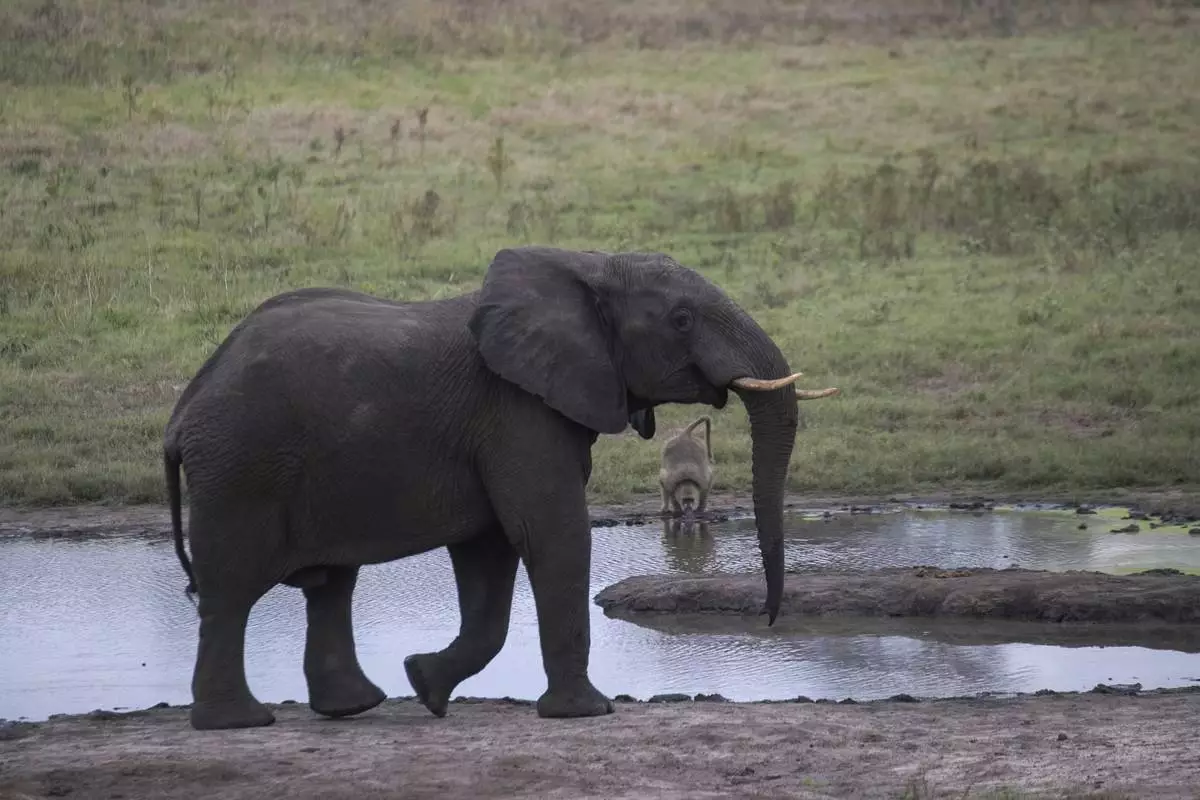
An elephant walks in the Hwange National Park, Zimbabwe, Monday, April 28 2025. (AP Photo/Aaron Ufumeli)
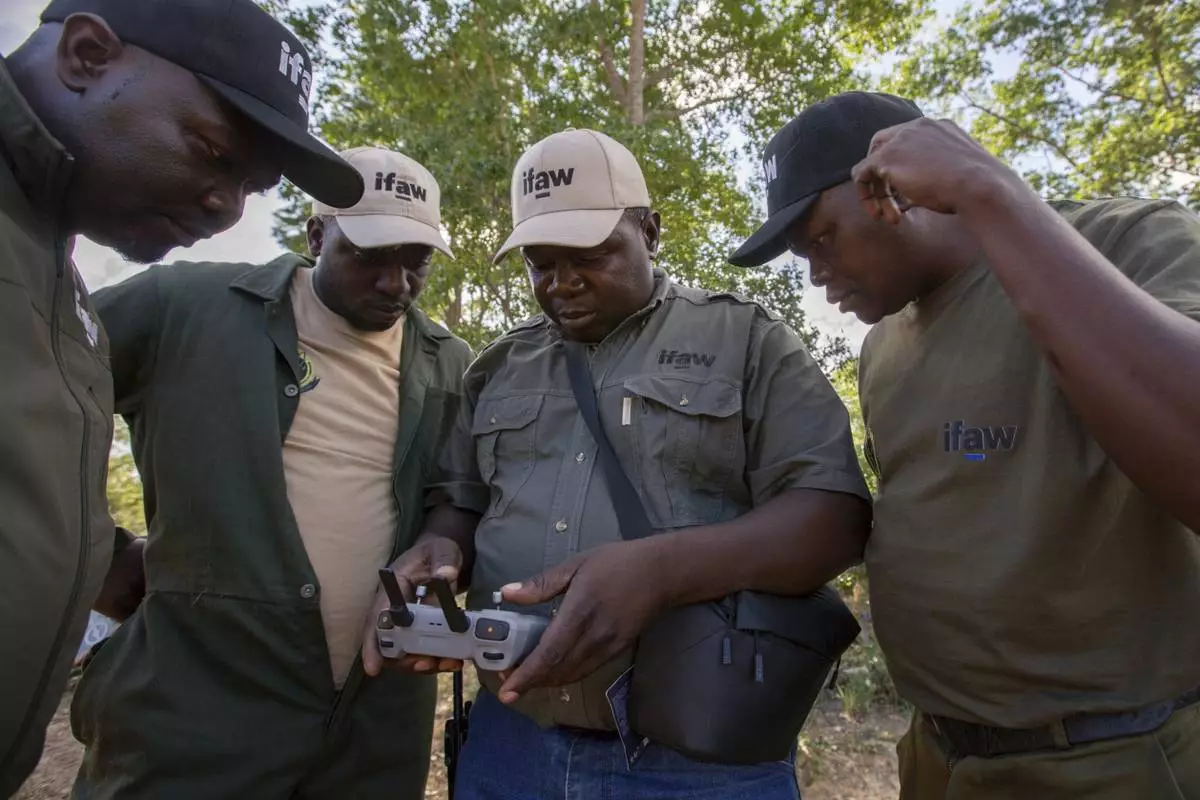
Zimbabwe Parks and Wildlife Management Authority and the International Fund for Animal Welfare officers monitor an elephant's movement using a drone in Zimbabwe’s Hwange National Park, Zimbabwe, Tuesday, April 29, 2025. (AP Photo/Aaron Ufumeli)
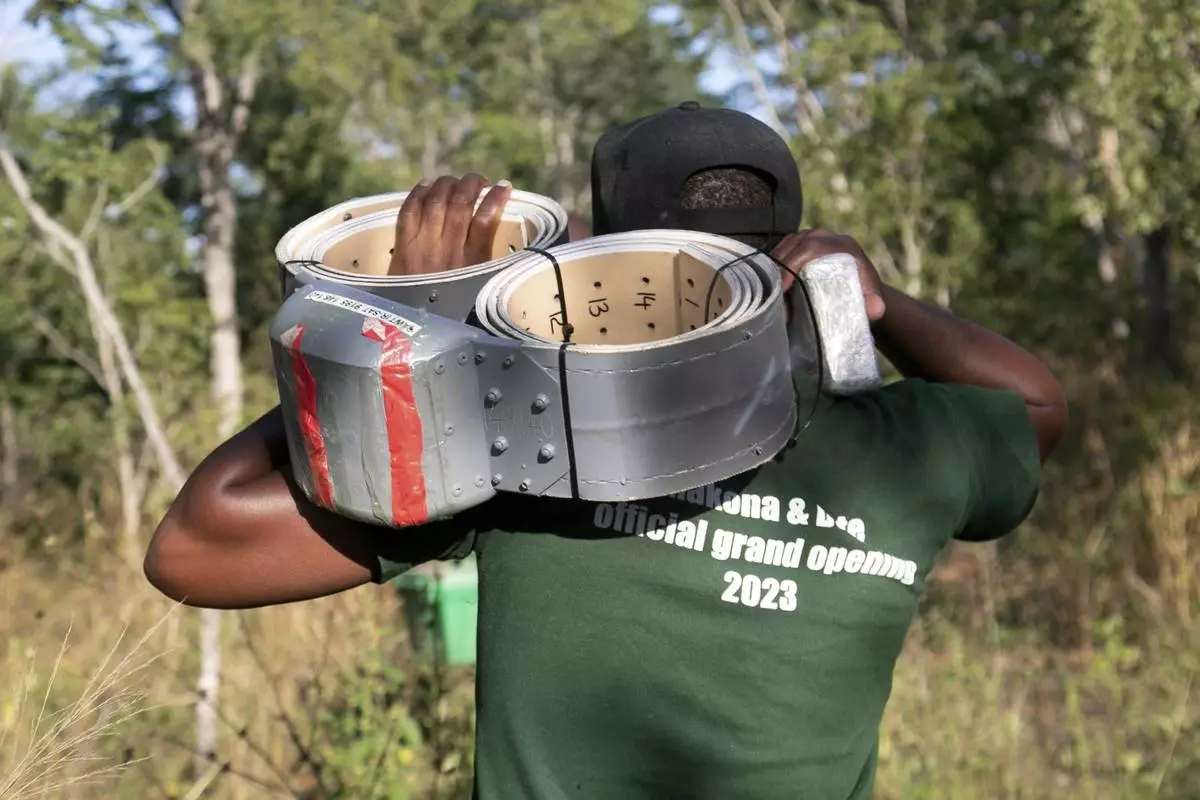
Zimbabwe Parks and Wildlife Management Authority officer carries a collar to be used to track an in elephant in the Hwange National Park, Zimbabwe, Tuesday, April 29 2025. (AP Photo/Aaron Ufumeli)
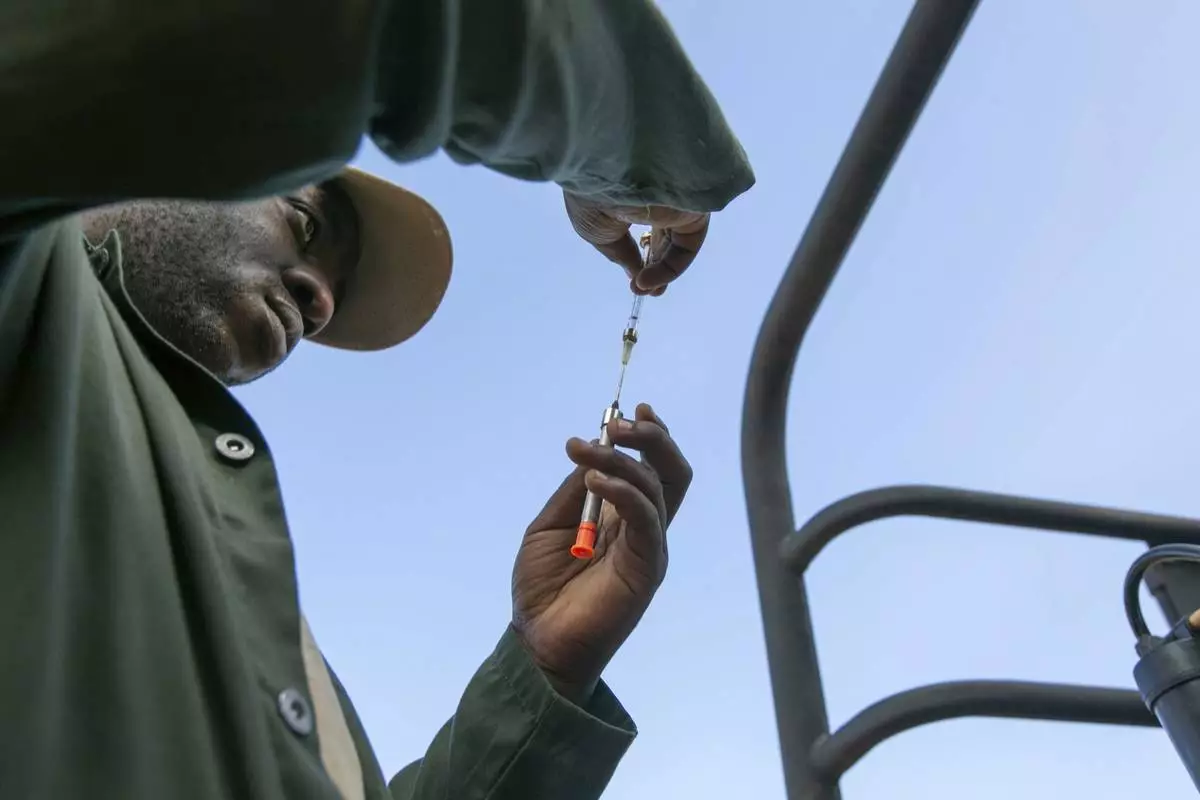
Kudzai Mapurisa, a Zimbabwe Parks and Wildlife Management Authority veterinarian, prepares to dart an elephant in Zimbabwe’s Hwange National Park, Tuesday, April 29, 2025. (AP Photo/Aaron Ufumeli)
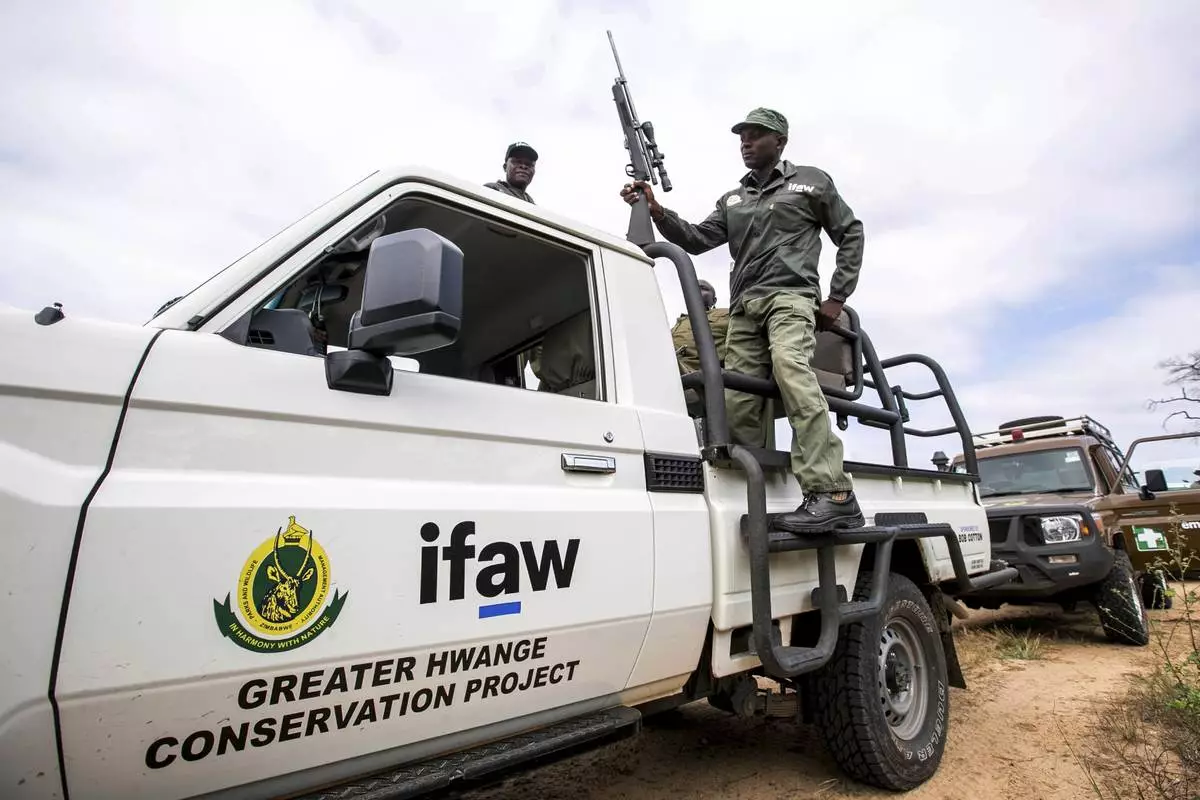
A Zimbabwe Parks and Wildlife Management Authority ranger carries a dart gun for elephants in the Hwange National Park, Zimbabwe, Tuesday, April 29, 2025. (AP Photo/Aaron Ufumeli)
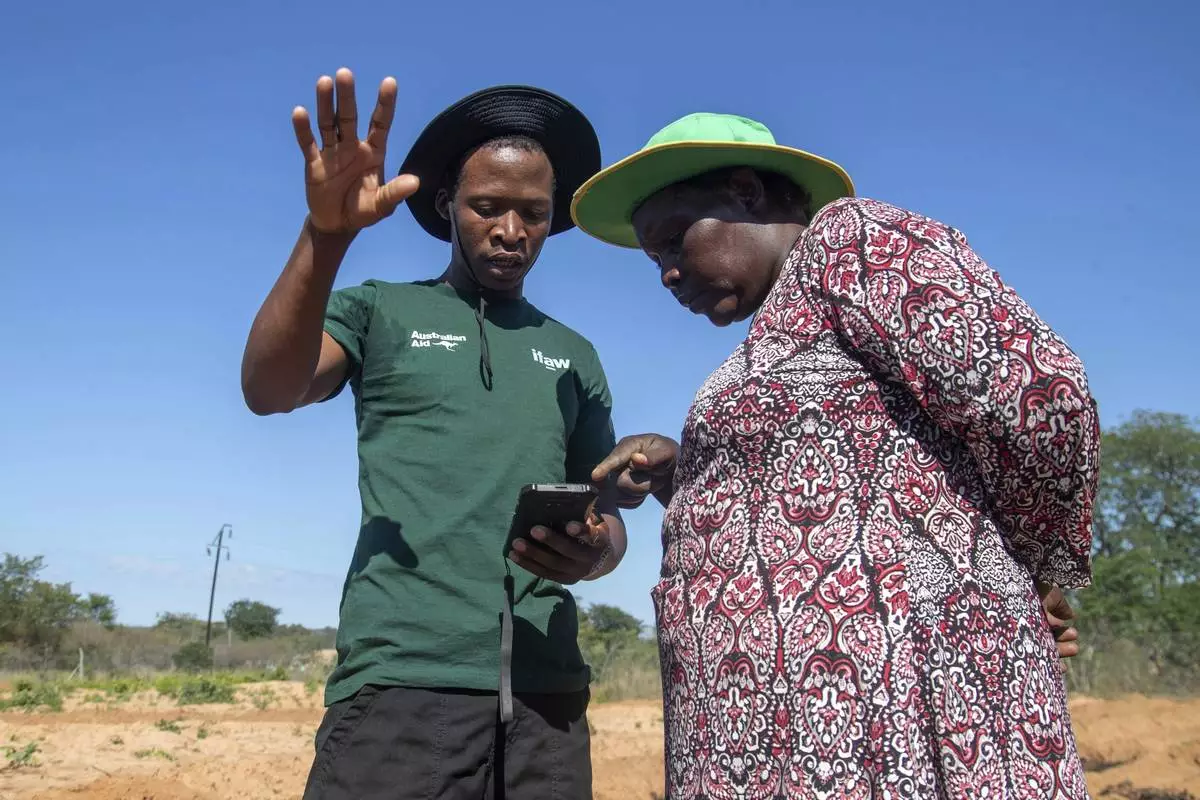
Capon Sibanda, left, a community guardian for encounters between people and elephants, talks with Senzeni Sibanda, a local councilor and farmer, in Hwange, Zimbabwe, Wednesday, April 30, 2025. (AP Photo/Aaron Ufumeli)






























































